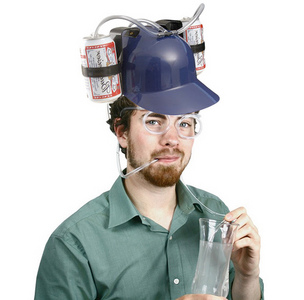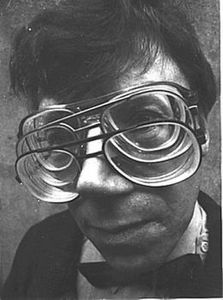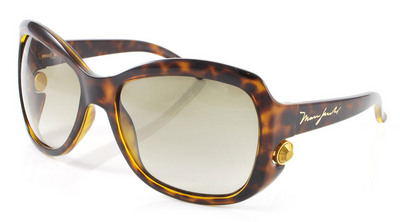Search
Recent
- Glasses Get High-Tech Part 3
- Glasses Get High-Tech Part 2
- Glasses Get High-Tech Part 1
- No optician required!
- Cheap Reading Glasses Bad For Eyesight
Popular
- No optician required!
- Glasses Consigned to History??
- Trends for 2010 and into 2011
- Which glasses suit my face shape?
Category
Archive
No optician required!
Category: Latest News
British inventor Josh Silver, a former professor of physics at Oxford University, has come up with a game-changer of a product design with his water-lensed glasses.
Silver has devised a pair of glasses which rely on the principle that the fatter a lens the more powerful it becomes. Inside the device's tough plastic lenses are two clear circular sacs filled with fluid, each of which is connected to a small syringe attached to either arm of the spectacles.
The wearer adjusts a dial on the syringe to add or reduce amount of fluid in the membrane, thus changing the power of the lens. When the wearer is happy with the strength of each lens the membrane is sealed by twisting a small screw, and the syringes removed. The principle is so simple, the team has discovered, that with very little guidance people are perfectly capable of creating glasses to their own prescription.
You can mass-produce millions of these, rather than manufacturing myriad individual lenses each tuned to a user's specific vision deficiencies. And while the one-size-fits-all mentality may not fly in developed nations, Silver's goal is to help the hundreds of millions of people in developing countries who suffer from poor eyesight.
Silver calls his flash of insight a "tremendous glimpse of the obvious"--namely that opticians weren't necessary to provide glasses. This is a crucial factor in the developing world where trained specialists are desperately in demand: in Britain there is one optometrist for every 4,500 people, in sub-Saharan Africa the ratio is 1:1,000,000.
The implications of bringing glasses within the reach of poor communities are enormous, says the scientist. Literacy rates improve hugely, fishermen are able to mend their nets, women to weave clothing. During an early field trial, funded by the British government, in Ghana, Silver met a man called Henry Adjei-Mensah, whose sight had deteriorated with age, as all human sight does, and who had been forced to retire as a tailor because he could no longer see to thread the needle of his sewing machine. "So he retires. He was about 35. He could have worked for at least another 20 years. We put these specs on him, and he smiled, and threaded his needle, and sped up with this sewing machine. He can work now. He can see."
So far 30,000 of Silver's specs have been distributed, but more are on the way; his eventual target is 100 million pairs.
via the guardian
Cheap Reading Glasses Bad For Eyesight
Category: Latest News
New research suggests that cheap reading glasses might be readily available, but in the long term they can cost you your eyesight.
By the age of 50, most adults have problems reading a book or newspaper without spectacles, so the arrival of the cheap glasses in supermarkets, high street stores and market stalls less than ten years ago has been seen as a saviour for many.
To avoid paying 100's of pounds for a pair of reading glasses from an optician that might easily be lost or broken, many buy several cheap versions to stash around the house so that they can always find a pair.
A researcher at consumer champion 'Which?' checked 14 pairs from seven high street chains and found that those carrying a higher prescription – plus 3.5 to plus 4 – considered to cause the most concern.
"Off-the-peg glasses could cause eye strain, blurred vision, headaches or double vision," The Daily Mail quoted the researcher as saying.
"For people with higher prescriptions, they're not suitable for walking or other mobile activities. They could even 'cause a nasty accident," he added.
The biggest problem is non-alignment, which means that the sight in one eye might be clear while the other is blurred.
"This could cause eye problems or a head tilt," the researcher said.
Opticians say eye examinations are essential before buying glasses. As well as ensuring the correct prescription is used, they can detect serious health issues, such as cataracts and brain tumours.
Glasses Consigned to History??
Category: Latest News
British researchers teamed up with colleagues around the world to pinpoint "variations" in DNA that make people more susceptible to myopia, the most common sight problem.
The breakthrough could lead to treatment in the next decade with eye drops or tablets that halt the distorted growth of the eyeball which causes the condition.
Shortsightedness is a relatively new but growing phenomena and as urbanisation and intensive education levels increase it is reaching epidemic proportions in some parts of the world.
Around a third of people in Britain are short-sighted, but in the Far East it is an even bigger problem, possibly because use of technology at an early age is more prevalent there. In Japan, two thirds of teenagers are already myopic and in Singapore, 80 per cent of 18-year-old male army recruits are short sighted, compared with 25 per cent just 30 years ago.
While watching television, reading and staying indoors is obviously having an effect, researchers knew that there was also a strong hereditary or genetic element to whether you succumbed.
In a study involving thousands of people around the world, including 4,300 in Britain, they searched for genes associated with degrees of myopia.
They found a number of variations around the RASGRF1 gene, which is associated with eye growth, seemed to be strongly associated with myopia - either preventing it or protecting against it.
Researchers now hope to be able to identify how exactly they affect the growth of the eye and then develop treatments that produce the perfect mix of genes.
In this way they should be able to prevent the eyeball distorting and therefore maintain 20-20 vision in most of the population.
"It is not quite the end of glasses yet but clearly the hope is that we will be able to block the genetic pathways that causes shortsightedness," said Dr Christopher Hammond at King's College London, an eye surgeon who led the British research.
"It will probably take the form of a tablet or eye drops but it is going to be a challenge and at least 10 years before there is a treatment."
The findings, published in Nature Genetics, will not be relevent to age-related longsightedness as this is to do with the eye muscles ability to focus and not to do with distortion of the eye ball itself. Reading glasses will still be needed for a while.
Are we worried? Not really.....
Sunglasses And Designer Ranges Revealed!
Category: Latest News
After finding success with our own-brand of prescription eyewear, SeeInStyle.com has recently expanded our range to include cutting edge designers such as Gucci, Roberto Cavalli and Moscot and more recently Sunglasses from brands such as Tag Heuer, Gucci, Rayban and Prada to name but a few. We have handpicked our favourite frames from around the world to offer the most unique collection of eyewear on the Internet. All these designer products at up to 70% cheaper than the high street!
We may be big on names and style but we're also enticingly low on price. All our designer glasses are customisable to match your prescription. If you find some prescription frames you want turning into sunglasses, we even currently have an unbeatable half price offer on UV coats and tints (was £20, now £10!). With fast Nationwide UK delivery you could receive your order within 5 working days (less for non prescription orders). It really couldn't be any easier!
So go on give it a go. Check out the latest prescription frames and discover that cheaper eyewear need not be a compromise on quality or style. See for yourself, See In Style.
eyeglasses to help put the world in focus
Category: Latest News
They’re no longer hip or modern; they no longer match your prescription or your style. Perhaps they just don’t fit or you never use them anymore?
For a person living in a developing country, used eyeglasses can help put the world in focus. For some, maybe even for the very first time.
SeeInStyle.com have teamed up with socially aware lifestyle magazine RECOGNISE www.recognisemagazine.co.uk to help grow awareness of the Clearer Today program, aimed at sending 1,000 pairs of used glasses to the developing world.
A new arrival to the consumer magazine market, RECOGNISE offers a lifestyle publication driven by a desire to be an ambassador for environmental awareness and a promoter of ethical living. Every two months sees an eclectic mix of fashion, travel, gadgets, food and beauty for both men and women. Content is defined by a commitment to pinpointing companies, people and brands that are all dedicated to social awareness and responsibility. Readers will enjoy reading about some of the world’s most exciting developments. Each and every feature found within our magazine has earned its status as it demonstrates and clearly believes in the ethos of giving something back.
The goal of the Clearer Today program is to meet the demand for quality eyeglasses in developing nations, providing otherwise unobtainable prescription eyewear to those who need it most. All types of eyeglasses and sunglasses, prescription and non-prescription are acceptable for recycling.
If you have a pair of unwanted specs or sunglasses – drop us an email at clearertoday@seeinstyle.com and we will arrange collection of your old glasses from you at no cost.
Don’t throw away someone’s chance for a clearer today. Donate your used prescription eyeglasses and someone in the world gets to see again
Readers of RECOGNISE also receive a 15% discount with SeeInStyle.com by quoting the code "recognise" during the check out process.
Blind Soldier 'See's' With His Tongue!
Category: Latest News
 I can barely stand, but I can see!!
I can barely stand, but I can see!!1 of 2 photos (more»)
A soldier blinded in battle has become the first member of the armed forces to test a special pair of prescription glasses which allow him to 'see' using his tongue.
Lance Corporal Craig Lundberg, who was blinded in a grenade attack in Basra, is testing prototype glasses which turn pictures into electrical impulses that are felt on the tongue. The different sensations mean he can distinguish between light and dark and negotiate his way around objects.
According to Craig, “It’s only a prototype, but the potential to change my life is massive. It has enabled me to pick up objects straight away, I can reach out and pick them up when before I would be fumbling around.”
Wow. When I first spotted this I thought this guy was going to be some kind of loon who really believed he could see with his tongue. Bit of a let down if I'm honest. On the bright side, what does this mean for the future of the sex toy?
5 Reasons To Buy Glasses Online
Category: Latest News
Currently most people buy their prescription glasses from their local opticians, but over the next few years more and more people will start buying their glasses online and here are the top 5 reasons shopping for glasses online is better.
1. Convenience - People live much busier lives than at any other time in history, and many of us just don't have the time to go look at glasses during the day when the stores are open. Buying your prescription glasses over the internet allows you to shop 24 hours a day 7 days a week and holidays. Unfortunately most shops are not open at 2am, but websites have the advantage of never closing
2. Cost - let's say I want to open a prescription eyeglasses store; the first thing I am going to need to do is find a location for my store. This store is going to cost me money for rent, then I need to hire staff, this is more expenses, then I have to pay for electricity, water and rubbish removal. So before I even buy my stock I am paying thousands of pounds a month. But I can save myself on rent, rubbish removal, electricity and sales staff. By doing this I can charge you less then my land based competitors and still make the same if not more of a profit, and because the internet is worldwide I am not limited to selling my glasses to people in my immediate area like a local store would be, I can offer my products to people in need of prescription eyeglasses and fashionable frames all over the globe.
3. Service - In a store the staff is considered sales staff. It is their job to make sales, and they may even get a commission on each sale they make. In an online store they have no sales people. The only people would ever need to talk to would be customer service and their job is to help you with any problems of questions, but they are not trying to make a sale or get you to buy expensive additions that you do not need. The information they provide is aimed at helping you and not at getting you to spend more money.
4. Selection - since they do not need to rent a store for their online prescription glasses shop they don't have to worry about not having enough room to display as many different types of glasses as they want. This allows them to offer you more selections and styles, such as aviator frames for example, without having to pay for a bigger showroom. All they need to do is place pictures of the different glasses on their website at no extra cost and this allows them to offer you bigger selections and lower prices.
5. Price - I know I mentioned that online glasses are less expensive, but I want to make it clear that by buying your glasses online you can save up to 70% on your prescription glasses. This is significantly less then what you will pay in any store. As a matter of fact you can get 2 pairs and it will still be cheaper than a regular store.
As I said there are many reasons to switch to buying your glasses online, and once you have shopped online and seen how stress free and convenient it really is you will never want to walk into a regular store again.
Glasses Help You Get A Job - FACT!
Category: Latest News
It seems that geek has truly become ‘chic’ with a new survey revealing some surprising statistics about New Zealanders attitude to glasses.
The online survey [The OPSM Style Review, Online Survey, February 2010], commissioned by OPSM and conducted by an independent research company, confirms that prescription glasses are sexy and can even help when you’re applying for a job.
Six out of ten of those surveyed believe wearing glasses help improve your chances of getting a new job, and just over half of those surveyed believe colleagues take those who wear glasses more seriously.
Overall, glasses have class according to New Zealanders. Considering the appearance attributes of fashionable glasses, a solid 70 per cent or more of respondents think they make people look knowledgeable, likeable, professional, stylish, successful and trustworthy.
OPSM spokesperson Jason Dhana says the survey results speak for themselves.
“The survey clearly indicates the stigma attached to glasses is well and truly gone. A staggering 74% believe that glasses can make people look sexy – you would never have got a result like that ten years ago.”
On the fashion front, a massive 94 per cent of respondents agreed glasses are now more fashionable than ever.
“New Zealanders love their glasses and believe they can not only enhance their appearance, but job prospects too,” Jason says. “It’s exciting to see that people are now viewing glasses in a really positive light – they’re more stylish and popular than ever before.”
Results
The online survey was conducted by independent research company Stellar Market Research Pty Ltd in February 2010 among 482 respondents in New Zealand aged between 18 and 60+
60.6% believe wearing glasses helps improve employment chances
56.2% believe wearing glasses helps to make a better impression at a job interview
55.8% believe wearing glasses makes a positive first impression in the workplace
53.9% believe colleagues wearing glasses are taken more seriously
74.1% believe that glasses can make people look sexy
92.7% believe glasses are more stylish than they used to be
More than 1 in 4 would consider wearing glasses as a fashion accessory, even if they didn’t need them to see
76.6% have noticed someone wearing glasses and thought how great they looked
Glasses can make people look attractive (75.9%), authoritative (73.2%), confident (74.1%), creative (73.4%), credible (77%), hard-working (71.2), intelligent (78%), knowledgeable (77.2%), professional (78.2%), stylish (77.6%), trustworthy (73%) and successful (76.3%)








